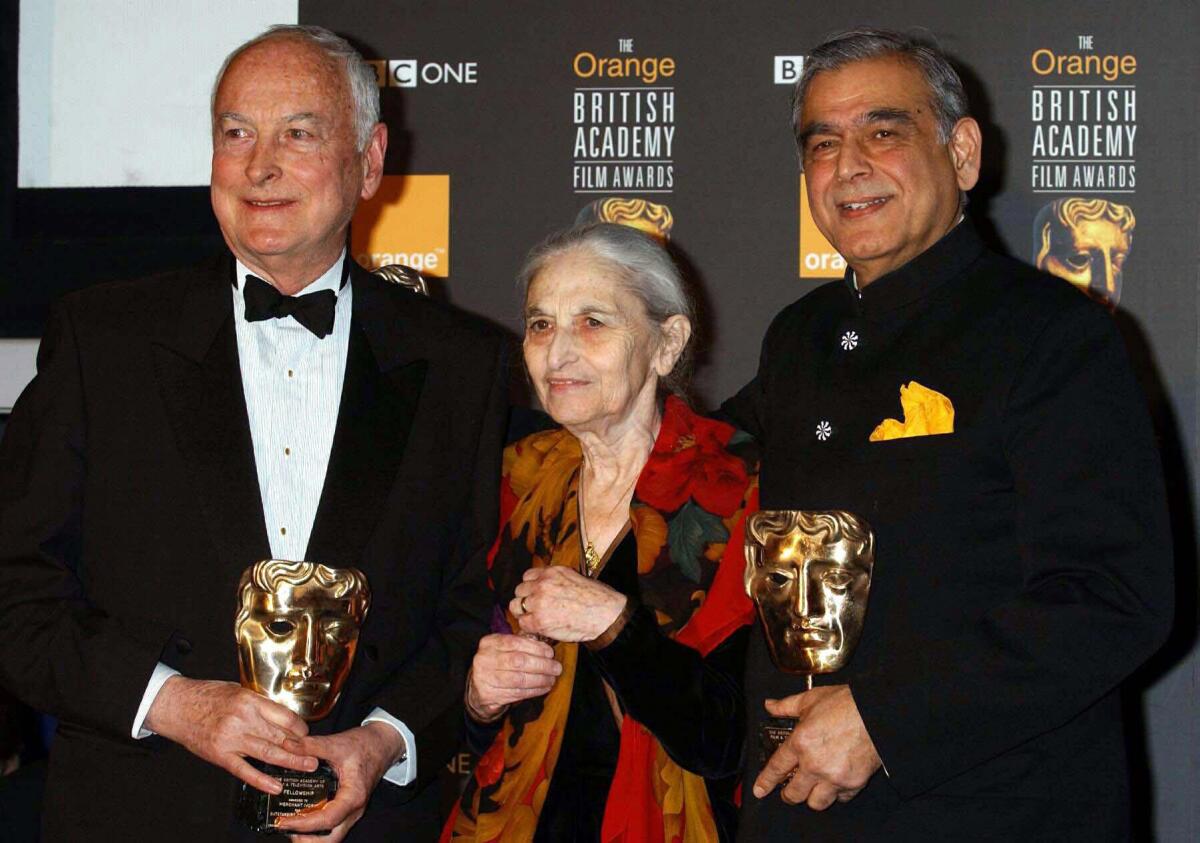Ruth Prawer Jhabvala, known for her screenplays, wrote of colliding cultures in her fiction

- Share via
Long before I discovered who Ruth Prawer Jhabvala was, I knew her work — and you probably do too. She adapted both “A Room With a View” and “Howards End” by E.M. Forster for the big screen, winning Academy Awards for both, as well as other classic novels like “The Bostonians” by Henry James and “The Remains of the Day” by Kazuo Ishiguro. She wrote some dozen other screenplays or so for Merchant Ivory Productions, but before she worked for Hollywood, Jhabvala was a fiction writer, winning the Booker Prize in 1975 for her novel “Heat and Dust.” Now, Counterpoint Press has collected a selection of her short fiction in a new book, “At the End of the Century.”
Jhabvala, a Jewish German refugee to Britain in the final days before World War II broke out, later married Indian architect C.S.H. Jhabvala, living with him in India and raising her children there. Many of the stories in this collection take place there (a few are in America), and according to author Anita Desai, who wrote the introduction (which was also published in the Guardian), Ruth Prawer Jhabvala, “like a great actor, becomes her characters and presents them to us from the inside out, not the outside in. She does not criticise or satirise them — as so many Indian readers accused her of doing — she becomes those she portrays.” According to one obituary after her 2013 death, such accusations emerged from critics only after it was discovered that despite her name, she wasn’t Indian. It’s hard to say how her career would play out now, but her stories do not seem, to this reader anyway, to satirize or criticize Indians or India — elements of satire appear rather in the do-gooder white female characters, and where there is criticism, it is of men and patriarchal structures.
Often, she begins stories by setting the scene, and she treats both Indian and American landscapes with the same eye for detail and mood. In “Miss Sahib,” which takes place in India, she begins: “The entrance to the house in which Miss Tuhy lived was up a flight of stairs between a vegetable shop and a cigarette and cold-drink one.” And in “Great Expectations,” which takes place in New York City, she describes in the first paragraph real-estate agent Pauline’s tiny office, “which was almost a storefront — it had been an unsuccessful dry-cleaner’s before she had rented it and was now in a row of other commercial establishments, including a deli, a nail spa, a newsagent and a jewellery boutique about to go out of business.” In other words, whatever locale she wrote about, she paid attention and made sure her readers did too.
Jhabvala first and foremost treated her characters as human beings whose desires were messy and complicated. One of her obsessions was the love triangle, but she didn’t succumb to the dull (and rather Hollywood) storyline in which the competing parties, here usually women, become bitter rivals for the affection of an often unworthy man. Instead, the women tend to become allies, their complex situations slowly becoming normal, if painful at times. In one story, “Two Muses,” the narrator’s grandfather Max, a famous German novelist, flees the Nazi regime with his wife, Lilo, only to be followed by his lover, Netta, and the relationships among the three shift over time. Netta at first is Max’s sole professional support, creating opportunities for him to meet with important journalists and agents. But over time, she becomes exhausted in her role, and in late middle age finally begins to live her own life and pursue her own pleasures, at which point Lilo becomes the one begging her to come back.
Another story, “Ménage,” is again about several women propping up the artistry of a man, this time the narrator’s own mother and aunt. This story hints at autobiographical elements, as the narrator is a writer, and the story ends with her admitting that the stories she writes “are mostly about the relations between men and women, which appears to have been the subject that has impressed itself most deeply on my heart and mind. I keep coming back to it, trying again and again to render my mother’s and my aunt’s experience, as I observed it, and my own. This account is one more such attempt.” There is a lot in these stories that goes unspoken, a lot of private wrestling with emotions like jealousy and hurt pride, but ultimately, there is a strange element of cooperation that proves that millennials did not invent the polyamorous relationship.
In other stories, Jhabvala keenly observes Western attitudes toward India, clearly scorning the spiritual quests of young and privileged English and American folk. She also condemns the falseness of certain Indian men who playact enlightenment while really building harems of gullible women who can pay for them to travel around the world in the lap of luxury.
As a collection, “At the End of the Century” provides a good starting point for anyone wishing to dip into Jhabvala’s oeuvre, and it stands on its own in its grappling with issues of love, family, white savior complexes and postcolonialism.
Ilana Masad is a writer, critic and PhD candidate at the University of Nebraska-Lincoln.
Ruth Prawer Jhabvala
Counterpoint: 448 pp., $26
More to Read
Sign up for our Book Club newsletter
Get the latest news, events and more from the Los Angeles Times Book Club, and help us get L.A. reading and talking.
You may occasionally receive promotional content from the Los Angeles Times.










